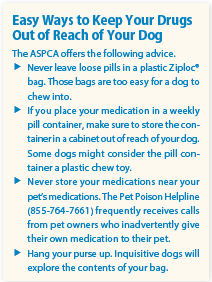Nearly 50 percent of all calls to the ASPCA’s Animal Poison Control Center are about pets inadvertently getting into medications for people. Pills can mistakenly be dropped on the floor or intentionally given to dogs in a well-meaning but ill-fated attempt to make a sick animal feel better. Here are the top 10 human medication complaints:
NSAIDS (nonsteroidal anti-inflammatories, such as Advil, Aleve, and Motrin). Even one or two pills swallowed by a dog can cause serious harm in the form of stomach ulcers and kidney failure.
Acetominophen (Tylenol). Along with potentially causing liver damage, this common pain killer can damage your pet’s red blood cells.
Antidepressants (including Effexor, Cymbalta, Prozac, and Lexipro). Antidepressants are prescribed for pets, but doses meant for people can lead to serious neurological problems: sedation, incoordination, tremors, and seizures. Some antidepressants also have a stimulant effect and can lead to a dangerously elevated heart rate, along with elevated blood pressure and body temperature.
ADD/ADHD medications (such as Concerta, Adderall, and Ritalin). These agents contain stimulants including amphetamines, and even minimal ingestion by a dog can cause life-threatening tremors, seizures, elevated body temperatures, and heart problems.
Benzodiazepines and Sleep Aids (for instance, Xanax, Klonopin, Ambien, and Lunesta). While these drugs reduce anxiety in people and help them sleep better, they can have the opposite effect in dogs. About half of dogs who ingest sleep aids become agitated instead of sedate, the ASPCA reports. Other possible effects in canines: severe lethargy, incoordination (including walking “drunk”), and slowed breathing.
Birth Control (for example, estrogen, estradiol, progesterone). Birth control pills often come in packages that dogs find irresistible. Small ingestions typically do not cause trouble. However, large ingestions of estrogen and estradiol can potentially cause bone marrow suppression (although that’s more common in birds). Female dogs that have not been spayed are at increased risk of side effects from estrogen poisoning.
ACE Inhibitors (like Zestril and Altace). ACE inhibitors (short for angiotensin-converting enzyme inhibitors) lower high blood pressure in people. This category of medication is typically safe for pets — and is even prescribed for them sometimes. But overdoses can cause low blood pressure, dizziness, and weakness.
Beta-Blockers (including Tenormin, Toprol, and Coreg). Like ACE inhibitors, they treat high blood pressure in people. But they can wreak havoc on a dog’s health even in small doses. Reactions include life-threatening decreases in blood pressure and also a very low heart rate.
Thyroid Hormones (such as Armour desiccated thyroid and Synthroid). Dogs get underactive thyroids just like we do, and the dose of thyroid hormone to treat a dog is actually much higher than the dose needed to treat a person. Thus, if a dog accidentally gets into your thyroid medication, there probably isn’t going to be a problem. That said, a large dose all at once can cause muscle tremors, nervousness, panting, a rapid heart rate, and aggression.
underactive thyroids just like we do, and the dose of thyroid hormone to treat a dog is actually much higher than the dose needed to treat a person. Thus, if a dog accidentally gets into your thyroid medication, there probably isn’t going to be a problem. That said, a large dose all at once can cause muscle tremors, nervousness, panting, a rapid heart rate, and aggression.
Cholesterol-Lowering Agents (like Lipitor, Zocor, or Crestor). Often called statins, these drugs are in many U.S. homes. Fortunately, most ingestions of these drugs by dogs cause only mild vomiting or diarrhea. It would take long-term use to cause more serious issues.





